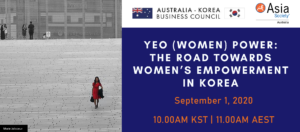What could be the economic benefits of addressing gender inequality issues in South Korea?
The Australia-Korea Business Council is pleased to invite you to our upcoming webinar, “Yeo (women) power: the road towards women's empowerment in Korea,” held in partnership with the Asia Society Australia. The Zoom webinar will be held on Tuesday 1 September at 10.00am (KST) or 11.00am (AEST).
South Korea is now the 11th largest economy, has the highest percentage of people with tertiary education in OECD countries and is one of the world’s most technologically advanced countries. Despite these successes, Korea has a 34% gender pay gap and the highest Glass-ceiling Index among developed countries. While Korean women are highly educated (82.3% of 25-34 year old women have completed tertiary education), only 57.6% of them are employed. Women also only make up 2% of boardrooms in 2020 and are underrepresented in politics. Alarmingly, South Korea’s birth rate is 0.98 and with a growing number of South Korean women choosing to pursue their careers over starting a family, Korea is facing a demographic crisis.
While some positive change is underway (feminist movements such as Me Too and Escape the Corset, and new guidelines on “gender equality in recruitment”) there is a long road ahead before Korea can benefit from the potential of its entire population.
To discuss what gender diversity initiatives and challenges look like in Korea and Australia, Liz Griffin, Executive Director of the Australia-Korea Business Council, will moderate a panel of business leaders, academics and thinkers including:
Sinjung Kwon, Partner at Mazars Australia;
Dr Kyungja Jung, Senior Lecturer of Social and Political Sciences Program at University of Technology Sydney; and
Frances Cha, Author of 'If I Had Your Face.'
Yvonne Kim, Executive Director of the Asia Society Korea Centre, will close the session.
Join this multi-disciplinary panel as we examine the social, economic, and business impact of gender inequality in South Korea, how Korea could benefit from greater empowerment from women, and what opportunities COVID-19 could bring to women in Korea

